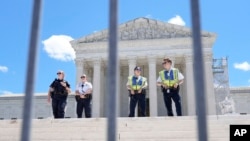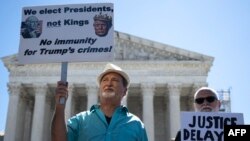The Supreme Court on Monday ruled that U.S. presidents have at least presumptive immunity from criminal prosecution for official actions taken while in office, and that they enjoy absolute immunity from criminal prosecution for exercising the "core" responsibilities of their office.
The case arose from a claim by former President Donald Trump that he is immune from criminal prosecution for his efforts to overturn his loss in the 2020 presidential election, which culminated in a mob of his supporters storming the Capitol and disrupting the certification of President Joe Biden's victory.
The most immediate effect of the ruling is that it virtually guarantees that federal charges related to the effort to overturn the 2020 presidential election will not be decided before the 2024 election, in which Trump is the presumptive Republican nominee. If he wins the election, he would be able to quash the prosecution altogether.
What the ruling means for the way future presidents conduct themselves while in office remains to be seen, but numerous experts said that the decision could open the door to abuses of power.
Conservative majority
The court's six-member conservative majority issued the opinion, written by Chief Justice John Roberts, on the very last day of an extended term, while the three members of its liberal wing issued blistering dissents.
The majority explicitly ruled out prosecuting Trump for a number of things he did in the aftermath of the election, including threatening a Justice Department official with dismissal unless he falsely claimed that the agency was investigating possible fraud in some states that voted for Biden.
However, it left open the possibility that prosecutors might be able to "rebut" the presumption of immunity as it applies to other official actions, and remanded the case to a lower court to make that determination.
The majority also noted that not every action taken by a president is "official," but said that it would also be up to the lower court to determine what actions do and do not fall under that category.
However, it also seemed to direct the lower court to use an expansive definition of what an official action is when it makes that determination, writing, "[T]he immunity we have recognized extends to the 'outer perimeter' of the President's official responsibilities, covering actions so long as they are 'not manifestly or palpably beyond [his] authority.'"
Strong dissent
The dissent from the liberal wing of the court, written by Associate Justice Sonia Sotomayor, was unsparingly critical of the majority's findings. The ruling, she wrote, "makes a mockery of the principle, foundational to our Constitution and system of Government, that no man is above the law."
"Whether described as presumptive or absolute, under the majority's rule, a President's use of any official power for any purpose, even the most corrupt, is immune from prosecution," Sotomayor wrote.
She went on to list a number of hypothetical scenarios in which a president could use his official actions to corruptly benefit himself, such as ordering the assassination of a political rival, directing the military to support him in a coup d'etat, or accepting a bribe in order to issue a pardon.
"With fear for our democracy, I dissent," Sotomayor wrote.
'Roadmap' for criminality
Ilya Somin, a professor at George Mason University's Antonin Scalia School of Law, said that he was surprised by the degree of latitude the ruling appears to give the occupant of the Oval Office.
"It creates significant encouragement for future presidents that they can do all sorts of illegal things, so long as they can shoehorn them into an 'official act,'" Somin told VOA.
"There should be no presumptive immunity for so-called official acts," he said. "If a criminal statute that Congress enacted is constitutional, then there should be no exemption from it just because the president is engaged in an official act."
David D. Cole, a professor at Georgetown Law and the national legal director for the American Civil Liberties Union, said that the ruling marked "a sad day for democracy."
"The Court essentially puts presidents generally, and President Trump in particular, above the law," Cole told VOA. "And it provides a road map for Trump, should he get reelected, allowing him to blatantly engage in criminal conduct using his official powers."
Paul Schiff Berman, a professor at the George Washington University Law School, called the ruling's definition of behavior that is immune to prosecution "extraordinarily broad" and agreed that it could well prevent any future president from being prosecuted for actions taken while in office.
"The court said that there is a presumption of immunity for any official act while in office, but the presumption can only be overcome if the prosecutor shows that the prosecution will not interfere in any way with the power of the executive," Berman told VOA. "So, it's hard to see how that presumption could ever be overcome in a criminal prosecution."
Trump celebrates
Shortly after the ruling was handed down, Trump used his social media network, Truth Social, to celebrate the court's decision, writing, "BIG WIN FOR OUR CONSTITUTION AND DEMOCRACY. PROUD TO BE AN AMERICAN!"
Although the case decided today has little or no bearing on a number of Trump's other legal challenges, some of which stem from activities he engaged in prior to becoming president, he claimed that the ruling ought to result in all legal cases against him being dropped.
Republican supporters of the former president were also quick to praise the court's findings, with some suggesting that it could completely undermine at least the two federal cases brought against Trump by Special Counsel Jack Smith.
"Today's ruling by the Court is a victory for former President Trump and all future presidents, and another defeat for President Biden's weaponized Department of Justice and Jack Smith," House Speaker Mike Johnson wrote on X. "The Court clearly stated that presidents are entitled to immunity for their official acts. This decision is based on the obviously unique power and position of the presidency, and comports with the Constitution and common sense."
Also on X, Ohio Senator J.D. Vance, considered one of the front-runners in the race to be named Trump's vice presidential running mate, wrote, "A massive win, not just for Trump but the rule of law. I'm still digesting but this may well destroy all of Jack Smith's case against the president."














